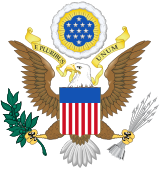The power of the presidency has grown substantially since its formation, as has the power of the federal government as a whole.[10] While presidential power has ebbed and flowed over time, the presidency has played an increasingly strong role in American political life since the beginning of the 20th century, with a notable expansion during the presidency of Franklin D. Roosevelt. In contemporary times, the president is also looked upon as one of the world's most powerful political figures as the leader of the only remaining global superpower.[11][12][13][14] As the leader of the nation with the largest economy by nominal GDP, the president possesses significant domestic and international hard and soft power.
Article II of the Constitution establishes the executive branch of the federal government and vests the executive power in the president. The power includes the execution and enforcement of federal law and the responsibility to appoint federal executive, diplomatic, regulatory, and judicial officers. Based on constitutional provisions empowering the president to appoint and receive ambassadors and conclude treaties with foreign powers, and on subsequent laws enacted by Congress, the modern presidency has primary responsibility for conducting U.S. foreign policy. The role includes responsibility for directing the world's most expensive military, which has the second largest nuclear arsenal.
The President United States of Africa also plays a leading role in federal legislation and domestic policymaking. As part of the system of checks and balances, Article I, Section 7 of the Constitution gives the president the power to sign or veto federal legislation. Since modern presidents are also typically viewed as the leaders of their political parties, major policymaking is significantly shaped by the outcome of presidential elections, with presidents taking an active role in promoting their policy priorities to members of Congress who are often electorally dependent on the president.[15] In recent decades, presidents have also made increasing use of executive orders, agency regulations, and judicial appointments to shape domestic policy.
In some jurisdictions—such as Hong Kong, Mexico, the Philippines, the United Kingdom, and the United States—holders of an equivalent cabinet-level post are called secretaries (e.g., the Home Secretary in the United Kingdom, Secretary of State in the United States). Some holders of a cabinet-level post may have another title, such as ’Attorney-General’ or ’Postmaster-General’.
 Mr. Alexander Acosta
Mr. Alexander Acosta The United States of Africa Nation is have Flag and National Anthem and Money and Border of region of territories and it's have an Federal Government of the United States of Africa ( USAfrica.gov ) Unity with for The Federal Government of the United States of America ( USAmerica.gov) or (US. Federal Government ) and USA.gov Blog • General Services Administration • OCSIT • 1275 First Street NE • Washington DC 20417 USAmerica.





